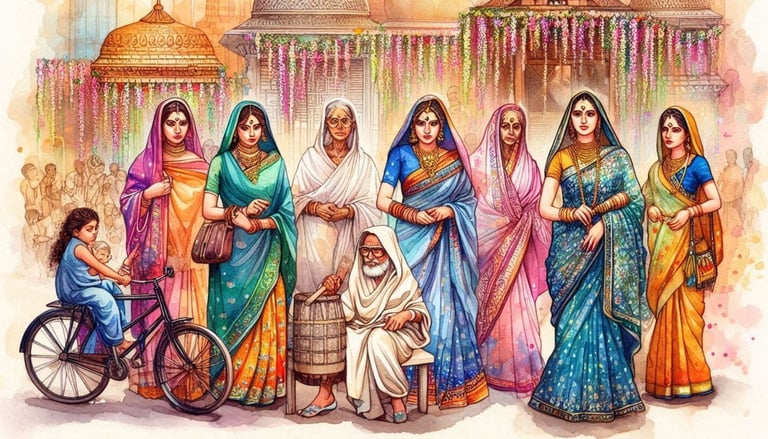Indian political philosophy and women's situation in the current scenario
Kotla Shiva Kumar
Central University Of Haryana
This blog is written by Kotla Shiva Kumar, a Law Graduate of Central University Of Haryana


As per our Hindu holy books likely in Vedas, women have given the supreme award to women that “Where women are worshipped, there the god dwells” But the scenario in the 18th, and 19th centuries is very different likely men were very patriarchal in society and homes. But change was aroused after a few social reformers worked for true women's empowerment as Mahatma Jyoti bai Phule taught his wife first and then the couple started the first Indigenous school for girls which opened in Pune. After that the situation in India and some customs created by human beings or men patriarchal society regarding the studies of women (Firstly was mentioned of Saraswati as a goddess in the Rigveda. Maa Saraswati was significant as a goddess from the Vedic period through the Modern period) during same phase women are given the same respect as like as men but till today we are seeing somewhat patriarchal norms regarding women's education and about their self-independency, few of them are included every sector, every position, likely as CEOs, Bankers, Investors, Teachers, Entrepreneurs, etc. are in different fields. However, the situation is changing day to day women enter every profession, business, etc. into politics.
Today we have our financial minister Nirmala Seetharaman Ji is a woman too, with many independent ministers in the cabinet of the current government. Indian-origin women are in top positions of world politics as likely as American vice president but it always reverses in India till date women parliamentarians in Lok Sabha are only 78 members & 15 % per (Highest after independence), In Rajya Sabha only 24 members & 13% per (5th most after independence).
More women in state leadership roles :
As of the stats women as head of state per January 1, 2023, is 11.3% of nations (17 out of 151, excluding those with monarchy-based systems) and Head of Government in 9.8% of countries (19 out of 193). Comparing these numbers to those from ten years ago, when they were 5.3% and 7.3%, respectively, shows an increase.
Europe continues to have the most number of countries governed by women (16) out of all the regions. There are more women cabinet ministers in Europe and the Americas. On Jan 1st of 2023, women represented 22.8% of Cabinet Ministers. The regions with the highest percentages include Latin America and the Caribbean countries (30.1%), Europe, and North America (31.6%).
But women remain neglected in most other regions, with figures as low as 10.1% in Central and Southern Asia There are just 13 nations, primarily in Europe, that have gender-equal cabinets, suggesting that at least 50% of the cabinet members are women leading ministries. Only 31 countries have female heads of state or government. Twenty-six percent of members of parliament are women.
In ancient India were valued and occupied prominent positions in the community at that time. The educational system was well-advanced during the Vedic era. The Educational system was very developed.
Women are framed by diverse socio-cultural political parameters and therefore are subject to factors enabling or constraining unique to a society. Besides, even within a particular country, a woman's position may vary in race and sexual orientation. While urban women in India have achieved a degree of empowerment, women in the village continue to lead a voiceless and deprived life, often made to follow the dictates of family patriarchs whose choices are imposed on their wives and daughters.
Daughters must be treated as ten sons to family not as tensions, still now the patriarchial society in rural areas likely villages, panchayat, mandal level education of girls or women is gradually low. To increase the percentage of literacy of women at the rural level, governments are introducing schemes and programs.
It motivates to get into local bodies and it makes a path to women into parliament as soon as possible. Women empowerment was started before independence as we witnessed many women as there are Ahilyabai Holkar, Rani Laxmi Bai, Rani Durgavathi, Rani Chennamma, Rani Chennabhairavi Devi, Rani Rudramma Devi, etc. are
Women empowerment module is changing by day by day as it is more important these days. Daily encouragement of women to get involved in politics has been an important priority in the accumulation of India's forthcoming state legislative elections. India placed 10th in the World Economic Forum Global Gender Gap Report 2024 for the political empowerment subindex as it scored 40.7%, which is significantly greater than its ranking in the other index dimensions of economic participation and opportunity, 112th for educational attainment, 142nd place in health and survival, and 129th overall. The political empowerment ranking is 65th as it is just a rank lower than the US position of 63rd and above the UK's ranking of 18th.
The number of female voters for every 1,000 male voters in India has grown dramatically over the years, from 715 in the 1960s to 883 in the 2000s. However, the 2019 general election was the first occasion in which women were more likely than men to cast ballots. However, women are less likely to affiliate with a political party or take part in politically charged public events like protests or elections.
References:
1. Vital Stats. (n.d.). PRS Legislative Research https://prsindia.org/parliamenttrack/vital-stats/women-in-parliament-and-state-assemblies
2. Women’s Reservation Bill [The Constitution (106th Amendment) Bill, 2008]. (n.d.). PRS Legislative Research https://prsindia.org/billtrack/womens-reservation-bill-the-constitution-108th-amendment-bill-2008-45
3. PM addresses the G20 Ministerial Conference on Women Empowerment. (2014). Pmindia.gov.in. https://www.pmindia.gov.in/en/news_updates/pm-addresses-g20-ministerial-conference-on-women-empowerment/
4. Kapila, S., Kapila, S., Kapila, S., Bayly, C. A., Sinha, M., Sartori, A., Chakrabarty, D., Mehta, U. S., Faisal Devji, Kumar, A., Chaturvedi, V., & Kapila, S. (2013). Political Thought in Action. In Cambridge University Press eBooks. Cambridge University Press. https://doi.org/10.1017/cbo9781139524018
